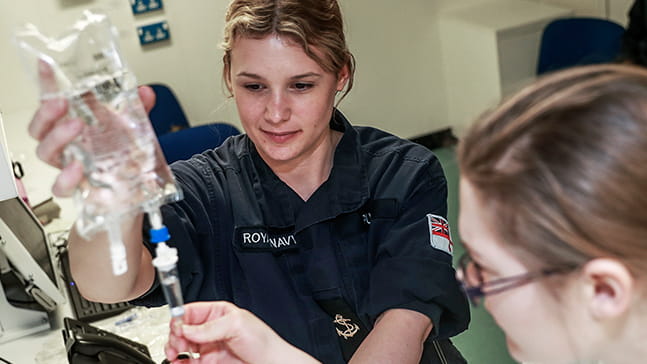Naval Nurse (Student)
You’ll gain the all skills and qualifications you need for a career in nursing.
High interest role
This is a highly competitive role with potential long lead time to join.
You may wish to consider joining the Royal Navy in a similar role:
- £15,500 - £57,000
- A-Levels / college qualifications
- Surface Fleet
- Medical
- Rating level
£25,200
£33,000
University
6 weeks
Free
Travel

Life in the Royal Navy is extraordinary, which is why I wanted to join in the first place. Doing vital work in some amazing places, gives you a real buzz.
Role details
What you’ll do
Joining the Royal Navy as a Student Nurse means you’ll get paid to study your BSc in Adult Nursing as Birmingham City University, completely paid for by us. You’ll complete Initial Naval Training at HMS Raleigh before starting university in either Sept or January, depending on when you get your A-level results. You’ll train alongside other military students, which means you’ll have great academic and personal support for the duration of your training. Once you’ve qualified, you’ll start at one of our Joint Hospital Group Units in Plymouth, Portsmouth or Birmingham. Personnel are embedded into the NHS trusts in these areas, where you’ll consolidate your nurse training. You’ll begin preceptorship and a 2-year foundation programme which enables you to rotate through different clinical areas. You’ll then get ready to deploy when required on one of our medical capabilities. You’ll have further opportunities to specialise in different areas, including Critical care, emergency medicine, primary care (and many more).
Your role
- Complete your BSc in Adult Nursing at Birmingham City University
- Once qualified, you’ll consolidate your training during preceptorship and the foundation programme
- Maintain clinical skills working alongside the NHS within a Joint Hospital Group Unit
- Deploy in challenging environments all over the world
- Take opportunities to carry out specialist courses in areas including Intensive Care, Emergency Medicine, Trauma and Orthopaedics, Primary Care and many more
- Become part of a world-class medical service that’s respected far beyond the Armed Forces
Pay & benefits
- A salary of at least £25,200 after you’ve been in-service for 6 months
- University fees paid for plus subsidised accommodation and an additional food allowance
- As a qualified Nurse, you’ll earn a salary of £38,000
- Fantastic pay and promotion opportunities throughout your career
- An excellent pension scheme
- Sports and adventure training
- Six weeks of paid holiday every year
- Free medical and dental care
Skills for life
Qualifications you'll gain
- BSc (Hons) in Adult Nursing
- You could have the opportunity for further post-graduate study in specialist clinical areas
- Ongoing Continuing Professional Development (CPD) opportunities
- Standard and enhanced learning credits for personal and professional development
- Civilian recognised Leadership and Management Opportunities
Skills you'll develop
- Command, leadership and management training with recognised civilian qualifications
- Clinical mentorship roles
- Ability to work outside your comfort zone in unfamiliar and challenging environments
- Leadership and management
- Adaptability and flexibility to carry your nursing skills into any situation
Eligibility
- Aged 17 and a half to 39
- Multiple entry points exist to gain 120 UCAS points; check with MSAT PO as not all accepted
- At least 3 GCSEs at grades A-C (9-4) (or Scottish equivalent), which must include English Language, Mathematics and a Science subject. Other Level 2 study may be considered
- Be a British or Irish national, or a Commonwealth citizen, or a Dual National. Dual Nationality restrictions do apply
- A Body Mass Index (BMI) between 18 and 28 (between 17 and 27 if under 18)
Skills & Interests
- Passionate and enthusiastic with an eagerness to learn
- Quick thinking and calm under pressure
- A caring and compassionate nature
- A team player>
- An adventurous spirit
Joining Process
From picking your role to starting on your first day, these are the steps you'll take to join as a rating.
Submit an application
Defence Aptitude Assessment (DAA)
You’ll be tested on: Verbal Reasoning, Numerical Reasoning, Work Rate, Spatial Reasoning, Electrical Comprehension and Mechanical Comprehension.
To prepare, you can practise the DAA
Interview
Medical and eye tests
Pre-Joining Fitness Test (PJFT)
Student Nurse Selection Board
Candidate Preparation Course (CPC)
Start training
Career Progression
Got a question?
Our virtual recruiter is available to answer your questions 24 hours a day
